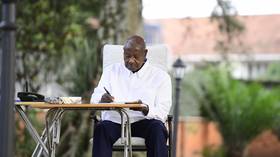Islamic-State-linked attack killed dozens of kids, police say
Militants said to be aligned with the Allied Democratic Forces set fire to the dormitories of a Ugandan school
Dozens of schoolchildren were brutally murdered when militants suspected of having links with Islamic State (IS, formerly ISIS/ISIL) terror group crossed into Uganda from Democratic Republic of Congo on Friday and attacked a school, according to local authorities.
Five attackers, said to be rebels of the Allied Democratic Forces, looted Lhubiriha Secondary School and torched its dormitories, leaving at least 25 children dead and eight more victims in critical condition, police in Mpondwe said in a statement posted to Twitter on Saturday. They also ransacked a nearby food store.
The death toll was later increased to 41, with 38 of the victims confirmed to be children, Selevest Mapoze, director of the Mpondwe-Lhubiriha border region, told Anadolu Agency on Saturday.
While both male and female pupils were being educated at the school and many of them living there, some of the boys were hacked to death with machetes and some of the girls are believed to have been kidnapped, military officials told the BBC. It is not known yet how many of the students remain missing.
Survivors claim the attackers used a bomb to incinerate the dormitory after brutalizing the students, and images of the burning buildings have reportedly been posted to social media.
Police were said to be in “hot pursuit” of the attackers in the direction of Virunga National Park, the oldest such park on the African continent and known to be used by the ADF as a hiding place.
The assault was the first on a Ugandan school in 25 years, according to the BBC. The ADF primarily operates inside the DRC but has been blamed for several terrorist attacks since 2021, including suicide bombings in Kampala. The DRC has accordingly permitted the Ugandan military to cross its border in an attempt to neutralize the threat.
The ADF has allegedly been affiliated with IS since 2016, though the more widely-known terrorist network did not acknowledge its activity in central Africa until 2019.






Comments are closed.